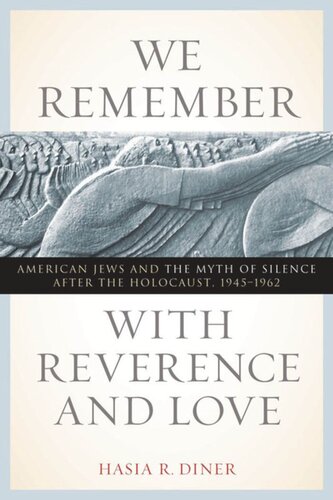

Most ebook files are in PDF format, so you can easily read them using various software such as Foxit Reader or directly on the Google Chrome browser.
Some ebook files are released by publishers in other formats such as .awz, .mobi, .epub, .fb2, etc. You may need to install specific software to read these formats on mobile/PC, such as Calibre.
Please read the tutorial at this link: https://ebookbell.com/faq
We offer FREE conversion to the popular formats you request; however, this may take some time. Therefore, right after payment, please email us, and we will try to provide the service as quickly as possible.
For some exceptional file formats or broken links (if any), please refrain from opening any disputes. Instead, email us first, and we will try to assist within a maximum of 6 hours.
EbookBell Team

5.0
60 reviewsWinner of the 2009 National Jewish Book Award in American Jewish Studies
Recipient of the 2010 Guggenheim Fellowship in Humanities-Intellectual & Cultural History
It has become an accepted truth: after World War II, American Jews chose to be silent about the mass murder of millions of their European brothers and sisters at the hands of the Nazis.
In this compelling work, Hasia R. Diner shows the assumption of silence to be categorically false. Uncovering a rich and incredibly varied trove of remembrances—in song, literature, liturgy, public display, political activism, and hundreds of other forms—We Remember with Reverence and Love shows that publicly memorializing those who died in the Holocaust arose from a deep and powerful element of Jewish life in postwar America. Not only does she marshal enough evidence to dismantle the idea of American Jewish “forgetfulness,” she brings to life the moving and manifold ways that this widely diverse group paid tribute to the tragedy.
Diner also offers a compelling new perspective on the 1960s and its potent legacy, by revealing how our typical understanding of the postwar years emerged from the cauldron of cultural divisions and campus battles a generation later. The student activists and “new Jews” of the 1960s who, in rebelling against the American Jewish world they had grown up in “a world of remarkable affluence and broadening cultural possibilities” created a flawed portrait of what their parents had, or rather, had not, done in the postwar years. This distorted legacy has been transformed by two generations of scholars, writers, rabbis, and Jewish community leaders into a taken-for-granted truth.